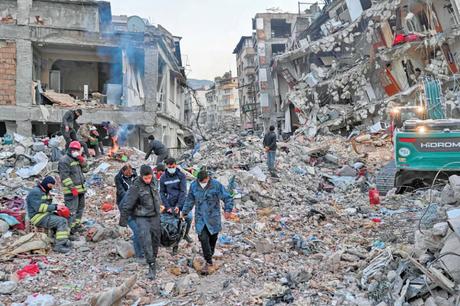
2023 was a year marked by significant events with major global impacts. Several earthquakes with widespread destruction and loss of life occurred. Two ongoing wars continued, increasing geopolitical tensions. The United States experienced numerous instances of gun violence. In Pakistan, a well-known former Prime Minister was imprisoned. These events, both natural disasters and human-made conflicts, posed significant challenges to nations and their citizens around the world.
Here is a look at some of the key stories that took place around the world last year:

February 6
Earthquake in Turkey and Syria
On February 6 early morning tremors measuring 7.8 and 7.7 on the Richter scale hit Antakya, Turkey, followed by several aftershocks. These earthquakes caused significant damage across parts of Turkey and neighboring Syria. Over 67,000 people were killed, with an estimated 59,000 fatalities in southern and central Turkey and over 8,000 in Syria. Thousands of buildings collapsed, trapping and injuring many residents. The earthquakes affected several historically significant cities, including Sanliurfa in Turkey and Aleppo in Syria.

Russia-Ukraine war spills into second year
Despite surpassing a year since its initial surge in February 2022, the Russo-Ukrainian War continues to escalate and inflict devastating consequences. Ukrainian President Volodymyr Zelenskyy faces the critical challenge of sustaining the flow of soldiers and weapons necessary to defend against Russian aggression. However, crucial Western allies like Europe and the United States have recently tightened their purse strings in response to evolving internal political situations.
This reduced financial and military support presents Zelenskyy with a formidable obstacle in keeping his forces adequately equipped and replenished. While confirmed casualty figures remain elusive, the United Nations estimates that over 10,000 Ukrainian civilians have tragically perished in the conflict.
Russian President Vladimir Putin, meanwhile, has maintained that the war will go on unless Kyiv does a deal that takes Moscow’s security concerns into account.
“Either we get an agreement, agree on certain parameters (on the size and strength of Ukraine’s military)… or we solve this by force. This is what we will strive for,” he said.

March 27
2023 Nashville school shooting
School shootings have, unfortunately, become a familiar part of the news cycle in the US. In March 2023, a mass shooting at an elementary school in Nashville, Tennessee grabbed headlines after a former student opened fire in The Covenant School building, killing six people, including three nine‑year‑old children. The shooter was shot dead by the police.

June 18
The lost submersible
The Titan submersible, carrying five people onboard, tragically imploded in the North Atlantic Ocean. The incident occurred during a deep-sea tourism expedition aimed at visiting the wreck of the RMS Titanic, which lies approximately 12,000 feet (3,658 meters) below the surface, some 400 nautical miles off the coast of Newfoundland, Canada. Following an extensive search and rescue operation that lasted several days, officials confirmed the recovery of a debris field approximately 500 meters away from the Titanic’s bow. The recovered debris was consistent with the remains of the 22-foot Titan submersible.

August 5
Imran Khan’s arrest and Nawaz Sharif’s return
2022-2023 witnessed a dramatic turn of events for Imran Khan, Pakistan’s former Prime Minister. In April 2022, Khan was removed from office through a no-confidence motion, marking the end of his tenure as Prime Minister.
Shortly thereafter, in August 2023, he was arrested and subsequently jailed in connection with the Toshakhana case. This ongoing legal controversy alleges that Khan failed to disclose details of valuable gifts received while in office. Following his arrest, his supporters engaged in protests and clashes with law enforcement, leading to tense situations, including attempted incursions into the army headquarters in Rawalpindi and the Corps Commander’s residence in Lahore.
Meanwhile, these significant events coincided with the return of another prominent Pakistani figure, Nawaz Sharif, a former Prime Minister who had been in exile in London for four years. Sharif’s unexpected return just before the upcoming general elections scheduled for early 2024 is widely perceived as a potential indicator of his renewed political ambitions.

September 19
Canada-India relations shatter
The India-Canada diplomatic relationship turned frosty this year after Canadian PM Justin Trudeau claimed that there was a “potential link” between the Indian government and the killing of a pro-Khalistan leader Hardeep Singh Nijjar in Canada earlier this year. Nijjar, who was the head of the Guru Nanak Sikh Gurdwara Sahib in Surrey and the chief of the separatist organisation Khalistan Tiger Force (KTF), was shot by two unidentified men outside the gurdwara in June.

October 7
The ongoing Israel-Hamas war
The ongoing Israel-Hamas war in Gaza has killed over 20,000 Palestinians, wounded tens of thousands more, and displaced 90% of the 2.3 million residents of the besieged enclave.
The current conflict was triggered by the surprise Hamas attack on Israel on October 7, in which 1,200 Israelis were gunned down in their homes, at a music festival and other public places by militants who overcame the country’s famed security and intelligence measures. The attack left thousands wounded and over 240 others were taken hostage, of which about half have been released as a part of a temporary ceasefire earlier this month.
Meanwhile, in a bid to stop the war, the United Nations had taken a series of extraordinary measures, including the triggering of Article 99 of the UN Charter.
A December 13 UNGA vote demanding an immediate humanitarian ceasefire in the conflict was adopted with an overwhelming majority of 153 nations (including India) voting in its favour, 10 voting against (including US and Israel) and 23 abstentions, but it has not translated to action on the ground.

November 3
The Nepal quake
More than 150 people were killed and hundreds of others injured after a 6.4 magnitude earthquake struck western Nepal on November 3. The quake, whose epicentre was at Ramidanda, about 550 km from the capital city of Kathmandu, was the country’s deadliest since 2015.
